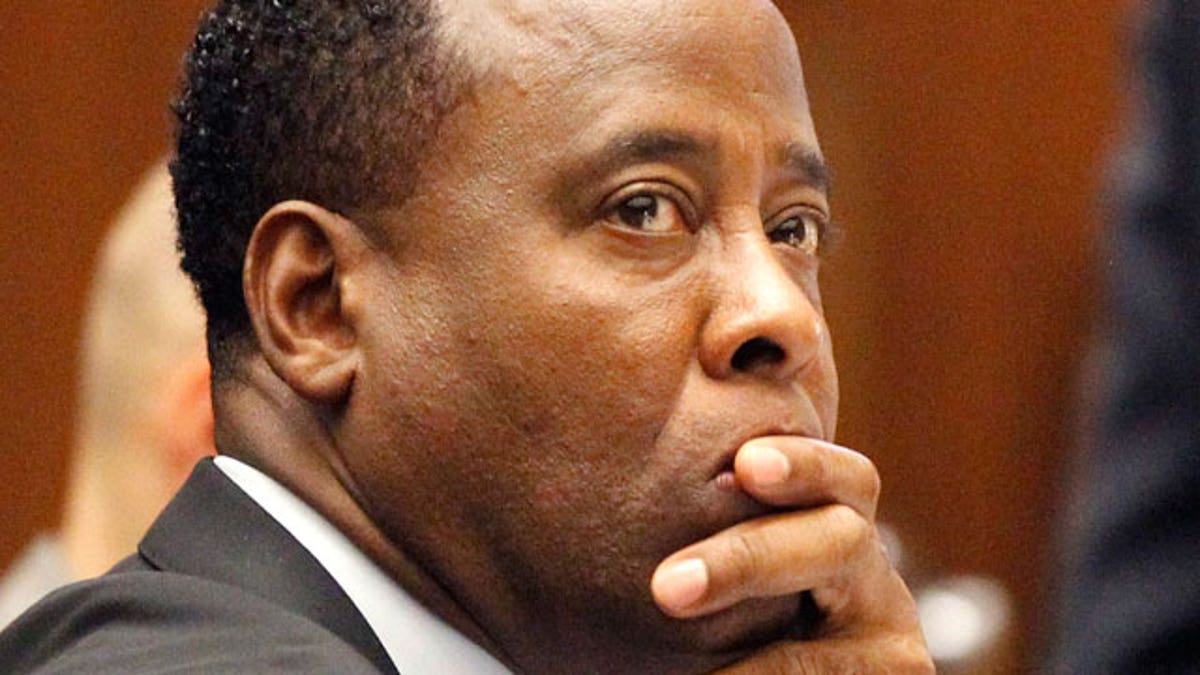
Dr. Conrad Murray, who is trial for manslaughter charges in the death of Michael Jackson. (AP)
The jury hearing the involuntary manslaughter case against Michael Jackson's personal physician is expected Tuesday to listen to the conclusion of the doctor's police interview that occurred two days after the singer's death.
Prosecutors began playing the more-than-two-hour recording Friday afternoon, but it was interrupted by the end of the court day. The remainder of Dr. Conrad Murray's interview with two police detectives includes his description of telling Jackson's mother and young children that the singer had died on June 25, 2009.
The interview ends shortly after the Houston-based cardiologist revealed where to find three bags in Jackson's bedroom closet that contained vials of the anesthetic propofol and other medical equipment.
Authorities contend Murray gave Jackson a lethal dose of the anesthetic and other sedatives while trying to help the singer sleep. Murray's attorneys however say that Jackson gave himself the fatal dose when the doctor left the room. Murray has pleaded not guilty.
The interview is Murray's version of events in Jackson's bedroom in the days and hours before the singer's unexpected death, but it is not the one that prosecutors want jurors to believe.
The cardiologist told police that he had only left Jackson alone for a couple of minutes to use the restroom before returning to find the entertainer unresponsive. But phone records presented during the trial, now entering its third week, show that Murray made multiple phone calls before realizing Jackson had stopped breathing -- including a 32-minute call to one of his medical clinics and another call to a girlfriend.
Murray made no mention of the calls during his police interview.
He told the detectives, who at that point hadn't yet ruled Jackson's death a homicide, that he thought the singer was becoming addicted to propofol after nightly treatments of the medication by Murray for roughly two months. He said he was trying to wean him off when things went wrong.
"He was my friend," Murray is heard telling detectives outside a noisy hotel ballroom on June 27, 2009. "I had no intention of hurting him."
According to a transcript released Friday, detectives asked Murray about his actions at the hospital after Jackson was declared dead, which prompted the doctor to describe telling the singer's mother and children that the singer had died.
Paris Jackson, the doctor said, was worried about being an orphan and expressed questions about why her father was dead.
"`Dr. Murray, you said you save a lot of patients, you know, you save people with heart attacks and you couldn't save my dad,"' Murray told the detectives Paris Jackson, then 11-years-old, said.
"`I know you tried your best, but I'm really sad," he continued, recounting her words. "`I will wake up in the morning, and I won't be able to see my daddy."'
But by the end of the interview, Murray and his attorney Ed Chernoff seemed to express surprise that detectives had not already located three bags filled with medical equipment, syringes and propofol bottles in Jackson's closet. Detectives wouldn't find the items until two days after the interview with Murray.
Murray told the detectives he always put the medications and equipment he used on Jackson away "because he wanted me not to have anything hanging around."
Detective Scott Smith then asked, "Where's your bag where those syringes would be now?"
"Oh, really?" Chernoff replied, according to the transcript.
"I don't have them," Murray replied, before telling the detectives exactly where to find the bags.
After jurors finish listening to the interview, prosecutors are expected to call a leading expert on propofol to explain the drug's effects and dangers to the panel. Deputy District Attorney David Walgren last week told the judge overseeing the case he intended to call Dr. Steven Shafer on Tuesday.
The prosecution case appears to be in its final stages, with coroner's officials, experts and police detectives among the remaining witnesses.
If convicted, Murray faces up to four years behind bars and the loss of his medical license.





















